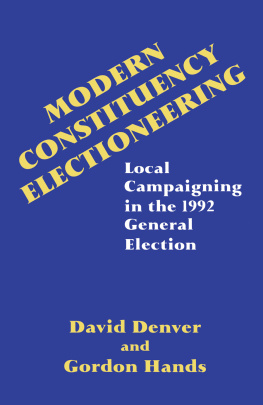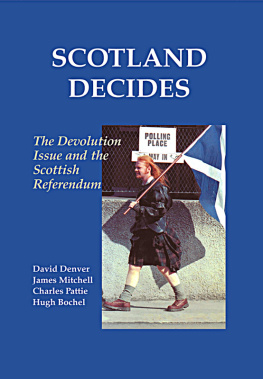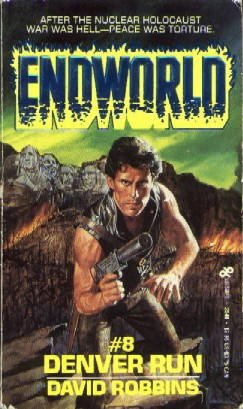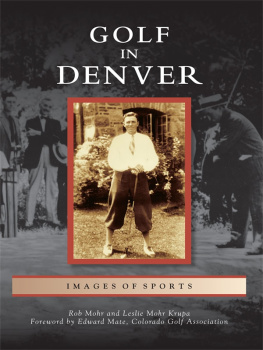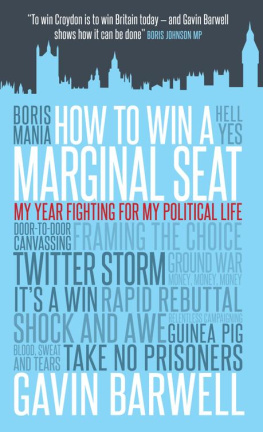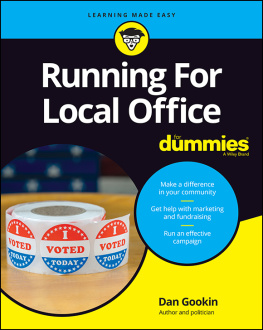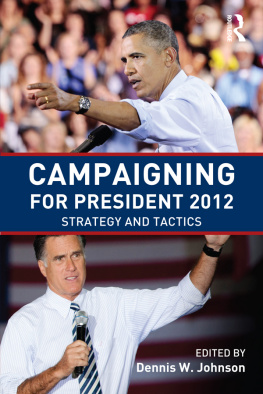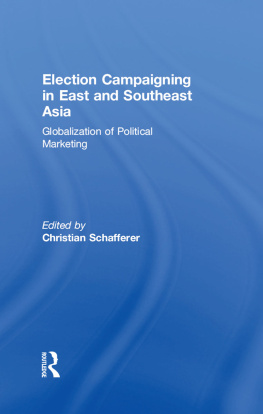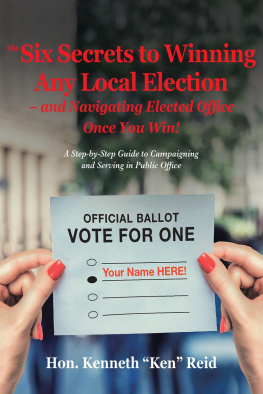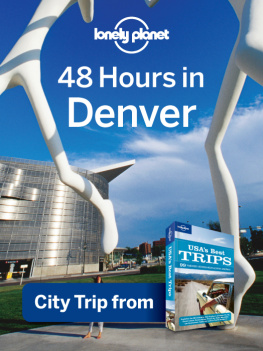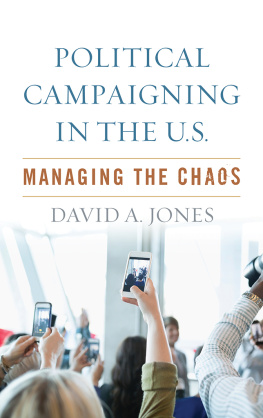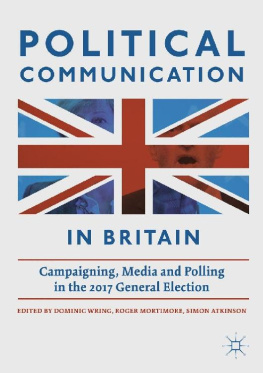First Published in 1997 in Great Britain and in the United States of America by
FRANK CASS & CO. LTD.
Published 2013 by Routledge
2 Park Square, Milton Park, Abingdon, Oxon OX14 4RN
711 Third Avenue, New York, NY 10017 USA
Routledge is an imprint of the Taylor & Francis Group, an informa business
Copyright 1997 David Denver and Gordon Hands
British Library Cataloguing in Publication Data:
A catalogue record for this book is available from the British Library
ISBN 978-0-7146-4789-0 (cloth)
ISBN 978-0-7146-4345-8 (paperback)
ISBN 978-1-3150-3678-6 (eISBN)
Library of Congress Cataloging-in-Publication Data:
A catalog record for this book is available from the Library of Congress
All rights reserved. No part of this publication may be reproduced in any form or by any means, electronic, mechanical, photocopying, recording or otherwise, without the prior written permission of the publisher.
SOME ASPECTS of British general election campaigns have a very high public profile. Party leaders hire private jets to whiz around the country and address huge enthusiastic rallies of supporters; spin doctors and communications experts are in constant touch with the national media and attend high-level strategy meetings in London; celebrities from the world of entertainment are drafted in to demonstrate their support for one or other of the parties; famous film directors produce election broadcasts on television; star television and radio presenters and interviewers interpret the campaign and interrogate the politicians on behalf of the whole nation.
Other aspects of campaigning have a much lower profile and are much less glamorous. Up and down the country, candidates in the constituencies try to engage the interest of the voters by walking around shopping centres shaking hands, visiting old people's homes or speaking to thinly attended meetings in local halls. Many thousands of volunteers trudge the streets delivering leaflets and knocking on the doors of less than enthusiastic citizens. On election day they stand outside polling stations for hours on end, noting down the registration numbers of electors as they come to vote. Although local campaigns can have their own excitement, they mostly consist of a lot of hard work with little obvious reward for the great majority of participants.
This book is about the more mundane side of campaigning constituency electioneering. This is a traditional, familiar and essential aspect of British general elections yet, while books concerned with national campaigning have appeared in a steady stream, it is almost thirty years since a book has been published on constituency campaigns. In the interim, the context within which campaigns take place has changed a good deal the mass media's treatment of politics and politicians, the technology and material available to campaigners, the nature of the party system and, perhaps most importantly, the perceptions and behaviour of the voters themselves. There are good grounds for thinking that constituency campaigns in the 1990s may be very different from those which occurred in the 1960s.
Our intention in this book is, first, to provide an account of the nature of modern constituency electioneering what local parties do, and how what they do differs from constituency to constituency and from party to party. More importantly, however, we seek to assess whether local campaigns are actually meaningless rituals a case of going through certain routines because they have always been gone through. This has been the predominant view among analysts and commentators for some time. We argue, however, that local campaigning does matter. The strength of a party's constituency campaign does make a difference to the number of votes it receives. In this respect, this book provides strong support for the views of party professionals and volunteers that local efforts bring tangible rewards and it is a significant addition to an emerging academic literature which takes the same view. Of necessity, demonstrating campaign effects - the subject of the book's later chapters requires some statistical analysis, which non-specialists may find difficult or even impenetrable. We hope, nonetheless, that the message is clear enough.
Like most authors, we have incurred a large number of debts. The most basic, perhaps, is to the ESRC (and, in particular, to the Election Studies Advisory and Management Committee) which provided funding for the research (award number Y304 25 3004). June Rye was our clerical assistant, but her contribution to the project went far beyond anything that that title implies. Like local campaigning, the kind of research on which the book is based frequently involves a good deal of drudgery packaging and posting questionnaires, coding, punching data, content analysis, etc. At various stages this was assisted by Susan Anderson, Alban Brown and Barbara, Rachel and Ritchie Denver.
The research project also involved colleagues in different parts of the country, who observed local campaigns and also interviewed party officials and television and radio journalists: John Benyon, John Bochel, Jack Geekie, Mike Hodkinson, Terence Karran, Roger Levy, Gavin Newsham, Robert Pugsley, Robert Pyper and Steve Williams. in part reflect their efforts and we are grateful to them and to the campaign monitors who assisted them.
Our research could not have been undertaken without the cooperation of the headquarters of the political parties. We are particularly grateful to Sir John Lacy, Tony Garrett and Shirley Stotter at Conservative Central Office; Joyce Gould and Sally Morgan of the Labour party; Chris Rennard of the Liberal Democrats; Allison Hunter of the SNP and Dafydd Williams of Plaid Cymru for their assistance in providing the information necessary to undertake the survey of election agents. In addition, we are grateful to the national and regional officials of the parties who agreed to be interviewed after an arduous campaign. Martin Harrop of Newcastle University read our original manuscript and made many helpful suggestions.
Finally, we must record our thanks to the election agents who responded to our questionnaire. For some, our questionnaire arrived at a time of deep disappointment, others were elated by their performance. But all must have been very tired and we are grateful, as well as relieved, that so many took the trouble to complete the questionnaire with a thoroughness and care one would expect from such dedicated people whose efforts frequently go unsung.
Responsibility for the selection and interpretation of material in what follows remains, of course, with us.
David Denver
Gordon Hands
Lancaster University
Modern British general election campaigns are fought at two clearly distinct levels. On the one hand there is the national campaign. This is dominated by leading party figures and increasingly by the party leaders themselves. The leaders jet around the country, accompanied by teams of aides, 'minders' and security personnel, as well as a 'media scrum' of radio and television crews and press reporters. They address large meetings and rallies of supporters, visit hospitals, schools and factories and give interviews to local media. Occasionally they meet and talk to ordinary voters, though usually this is done so that they can be seen doing so on television. In addition, this campaign involves launching the party's election manifesto, party election broadcasts, interviews and discussion programmes on television and radio, carefully staged daily press conferences in London, organised 'photo-opportunities' and advertising in the national press. All of this forms the basis for the reporting of the campaign by the national media. For most people, this is the campaign; it is the aspect of campaigning which impinges most persistently and directly on their consciousness as it is played out before their eyes on television and, although the vast majority of the electorate are mere spectators, it generates a considerable degree of interest and excitement.


